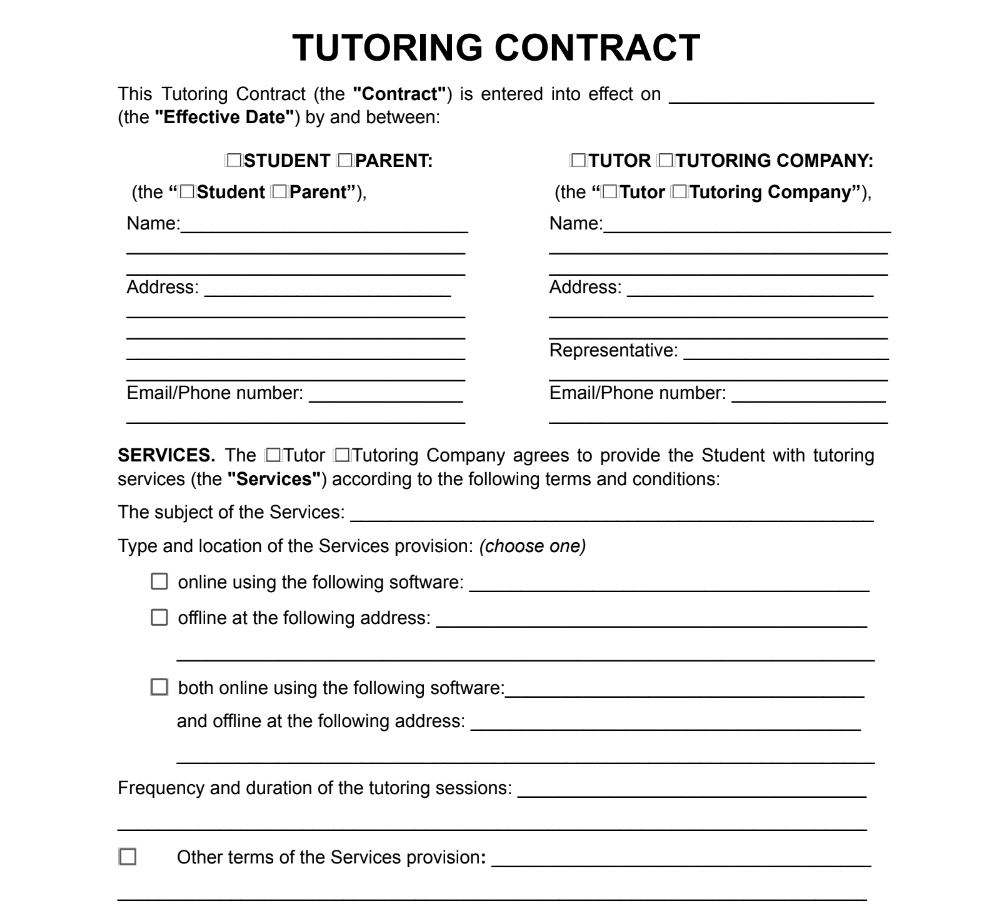When to Use a Tutoring Contract
A tutoring contract should be employed whenever a tutoring relationship is established. It is advantageous in various situations:
- One-on-one tutoring: Whenever a tutor is engaged for individual sessions, the contract should clearly specify the terms of the engagement.
- Group tutoring: If a tutor is hired to teach a group, a contract helps define the relevant terms, such as group size, location, and specific goals.
- Online tutoring: The advent of technology has led to the proliferation of online tutoring. A contract becomes equally significant in these situations to ascertain the logistics of the online sessions.
- Tutoring agencies or centers: Tutoring centers should always use contracts to formalize the relationship with their students. This helps establish a standard of operation and expectations.
Terms and Parties of Tutoring Contract
A sample tutoring contract involves two primary parties, each with distinct roles:
- Tutor (Tutoring company): The entity or individual who is providing the educational service.
- Student (Parent): The individual who is receiving the educational service or the person representing the student.
The tutoring contract example between these parties often includes the following terms:
- Subject and objective: The specific area of study and the intended goals of the tutoring sessions.
- Location of tutoring: Where the tutoring sessions are to be held, whether at the tutor’s home, the student’s home, or online.
- Payment details: Clear information about the tutoring fee, payment schedule, and preferred method of payment.
- Session details: Length, frequency, and proposed timetable of the tutorial sessions.
- Cancellation policy: Any terms related to canceling or rescheduling tutorial sessions.
How to Create a Tutoring Contract
A tutoring contract has all the necessary details to make it fair for everyone involved. If the student is still a child, a parent or someone who takes care of them should also read and sign the contract to make sure it’s in the best interest of the student. And when you’re getting ready to write this contract, you can save time and find helpful tips from a tutoring contract template free of charge.
Now, let’s walk through the steps on how to put together a tutoring contract:
- Identify the participants: Write down the names of the tutor and the student (or student’s guardian) who will be part of the contract. Use their full names and include their contact information.
- Set the scope of the contract: Write down exactly what the tutoring will encompass, including the subjects to be covered and the goals you aim to achieve.
- Detail the payment terms: Describe how much the tutoring will cost, any agreed payment schedule, and the possibility of any additional costs, like materials or travel expenses.
- Describe the tutoring sessions: Provide detailed descriptions of sessions, such as where they will take place, how often they will occur, their length, and the proposed schedule.
- Outline the cancellation procedure: Detail the policy for missed sessions, including the procedures for rescheduling and cancellation.
- Signatures: As a final step, all involved parties should sign and date the contract. Once it is signed, ensure that everyone has a copy for their records.
With a solid tutoring contract in place, everyone can step into the tutoring journey with confidence, allowing them to concentrate fully on the most important aspect — the process of learning.
For those seeking to create a comprehensive tutoring contract, a simple solution is readily available. You can find and download a tutoring contract template in both PDF and Word formats on Jurizmo. By following these steps and using the right template, you can create a complete tutoring contract that fits your situation perfectly.
 Preview
Preview

 Preview
Preview
